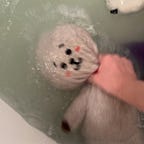Trashing The Standard: The Ideal Afro is not A View-blocking Mane
For long a time now, many Nigerian women, like other Black women in every part of the world, have been subjected to conforming to Eurocentric beauty standards, which they have never been able to meet up with, regardless of how much they try. One of those standards they have had to stick to is the definition of the perfect hair as straight, neat, and classy and the natural afro as rough, nappy, and wild. To achieve the ideal hair, many black women resorted to straightening their hairs with relaxers, which they used constantly, especially when their natural hair pops out beneath the straightened strands. The continuous use of relaxers no doubt damaged lots of hairs and even, exposed the users to many health risks due to the harmful chemicals present in some of them.
However, in recent years, a great number of Nigerian women(including me) have joined other Black women in embracing their natural hair. We should applaud ourselves for succeeding in getting rid of the Eurocentric hair standard, but I do not recommend continuous applause. Why? I discovered that as the standard is fading away, it is being replaced by another, which defines a long, soft, and full afro as the type of hair that black women should aspire to have. This somehow explains why the natural African haircare market is teeming with numerous hair growth products, some of which may be detrimental to the user’s health.
The ideal afro standard (although, its existence not fully acknowledged) is more damaging than the Eurocentric hair standard because it affects women’s self-esteem when they do not meet up with the beauty standard. From my experience and interaction with many Nigerian women who have transitioned from relaxed hair, their stories are often the regretful 'what I ordered versus what I got’. The idea they nursed when they embarked on the journey was that natural hair is a promise of full, long, and wild tresses that has to be kept by Mama Africa. Many of them became disappointed and began to feel bad and insecure when their hairs did not grow into a full mane(especially within a short time).
When I was deliberating on whether to transition to natural hair or get a big chop, I met a hairstylist and tried to seek her opinion. She plunged into her story of how she went from keeping relaxed hair to natural and back to relaxed hair, and how that natural hair phase was the most difficult in her life. It refused to grow and combs broke midway into combing. She strongly advised me not to try it, because I might end up regretting it. Woah! Right? That response was similar to 90% of all the answers I got from women whose opinions I sought. This is how many Nigerian women feel about their natural hair, mostly because we are length obsessed as a result of the ideal afro picture which is either a large mass of curls or a wild 4C mane that is 4 times bigger than the head that carries it.
The fact that hair is strongly believed to form an important part of black women’s identity worsens their(Nigerian women) insecurities amid the pictures the society shove at them. For instance, I rarely see black cover girls with moderate afros. Hair products are usually adorned with pictures of black women with huge hair. Even paintings and graphic arts portray black girls as dark-skinned and huge, curly-haired. More often than not, only the huge hair draws attention and awwwns. Also, when average Nigerians say “Hair is the beauty of a woman”, the unspoken words before ‘hair’ are usually ‘long, thick, and full’, hereby regarding women with naturally short hair, cropped hair and bald head as nothing close to beautiful. Women, therefore, go from discarding Eurocentric hair standards to becoming insecure about their natural hair. All these have resulted in women trying any recommended substance on their hairs which may result in hair damage, just to achieve the head-turning fro. Just as porn has shaped the idea of how women’s body should be for some men, the visual representation of afro hair has shaped the idea of what it should and should not look like.
Every hair has its shortcomings, so it is necessary trash the perfect or ideal hair picture living rent-free in your head. Black women’s hair do not grow in the same way. I also had my fair share of the hair worries after my big chop. I was hoping my hair would be anything but 4c, the common Nigerian hair type. But as months progressed, I abandoned my worries and did all sorts with my, then, short hair. I never visited the salon (I still haven’t), and I washed, treated, and styled it all on my own. I had fun with DIYs and mini twists, so yeah, short hair is fun.
So, dear sister, the ideal afro is not the view-blocking mane, neither is it the bouncy type 4a curls. The ideal hair does not exist. Discard your length obsession and embrace your hair the way it is. Although natural African hair can grow to an unbelievable length, more often than not, genes are responsible for how the hair grows, so you may not be doing anything wrong or less if your hair stops retaining length. The most important you should is maintain a hygienic haircare routine (it does not have to be expensive!). The African natural hair allows you to go ‘one week, seven different hairstyles, therefore, have fun with your hair regardless of its texture or length. Remember, life is too short to have boring hair.
